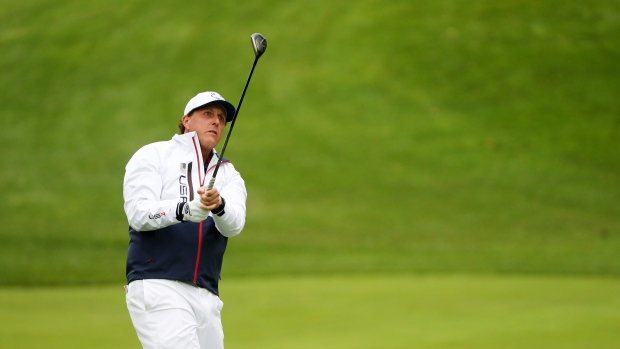Sep 28, 2016
Mickelson plays blame game when it comes to Ryder Cup failure
Phil Mickelson took no time on Wednesday in laying blame on past captains for the United States' Ryder Cup failure that has seen just one victory (2008) in the last seven events. Bob Weeks has more.
By Bob Weeks

In his 30 minutes in front of the assembled press on Wednesday at the Ryder Cup, Phil Mickelson managed to take another back-handed poke at Tom Watson’s 2014 captaincy, lob a shot at 2004 U.S. captain Hal Sutton and praise current leader Davis Love all before most people had finished their morning coffee.
It was all, he said, to show how a Ryder Cup captain can make a big difference in outcome without hitting a shot, something that Watson and Sutton apparently didn’t do so well.
“I think that when you look back on what the difference is, when players are put in a position to succeed, oftentimes, more often than not, they tend to succeed and when they are put in positions to fail, most of the time they tend to fail,” said the left-hander.
“This is a year where we feel as though Captain Love has been putting us in a position to succeed," he continued. "He's taken input from all parties. He's making decisions that have allowed us to prepare our best and play our best, and I believe that we will play our best.”
That last part may have been a veiled punch to the midsection of Watson, the 2014 captain who was dusted off and put in charge in hopes of ending the American drought at the team competition. Instead, he was on the losing end and received a post-event lashing by Mickelson for his handling of the team. In no particular order, the left-hander said Watson failed in his approach to team-building, for his refusal to allow for any outside input and especially his lack of communication.
Those kinds of comments were usually reserved for the team room, but Mickelson took them public, airing the dirty laundry at the closing press conference and hoping to force some change.
It worked and the PGA of America established the "Task Force," a large group of players and executives who were tasked with finding out what was wrong with the U.S.A.’s teams.
To further illustrate just how a captain can have an effect, Mickelson dredged up some ancient history, using the 2004 team and Sutton’s famous decision to pair Mickelson with Tiger Woods as an example.
“Tiger and I were paired together and we ended up not playing well,” he said of the double drubbing the duo took, first in fourballs and then foursomes. “And was that really the -- was that the problem? I mean, maybe. But we were told two days before that we were playing together. And that gave us no time to work together and prepare.”
Mickelson said he had only four or five hours to try and learn how Woods’s ball reacted to his swing, time that would usually have been spent preparing for the matches in his usual fashion. Perhaps that’s why he hit tee shots out of bounds. Or maybe it was the fact that Mickelson also put new equipment – he’d switched to Callaway the week prior – into his bag, something he never mentioned at this press conference.
“Now, I loved -- I'm not trying to throw -- to knock anybody here, because I actually loved how decisive Captain Sutton was,” said Mickelson, doing precisely that. “I feel like that's a sign of great leadership to be decisive. Had we had time to prepare, I think we would have made it work and could have had some success.
“But that's an example of starting with the captain, that put us in a position to fail and we failed monumentally, absolutely. But to say, 'Well, you just need to play better,' that is so misinformed because you will play how you prepare.”
So instead, the Task Force was charged with figuring out how the heck the Americans keep getting beat. But all this really didn’t warrant a task force: all that was really needed was a look across the green at their opponents. The Europeans have been establishing continuity to their teams, not so much in players, but in leaders. Players become vice-captains who become captains, promoted after they learn how it’s done.
The Americans kept plucking their leaders and dropping them in blind. Now they’ve had a eureka moment that has made Mickelson very happy.
“This is the foundation week for us,” he stated. “This is the week where all the past captains, past vice-captains, PGA of America officials, caddies, have had involvement in the decision-making process. And from this, we'll work forward and keep continuity into 2018 and from that we'll build on in 2020.”
We’ll see if that happens. If the U.S. wins, they’ll look like geniuses.
If they lose, we’ll see who is next to get thrown under the bus.
